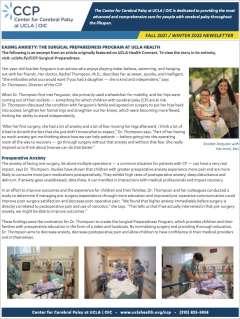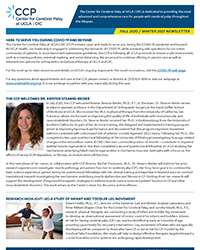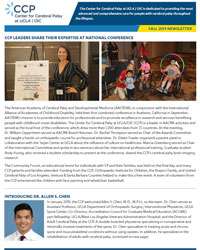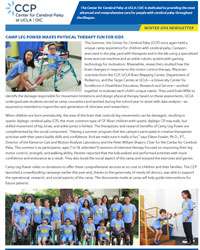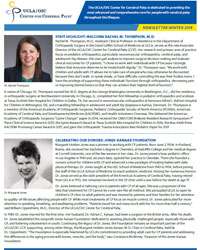Newsletters
Find your care
We care for patients with cerebral palsy in all life stages. To learn more about cerebral palsy treatment at UCLA Health, call 424-259-6593.
Newsletters - Center for Cerebral Palsy
Center for Cerebral Palsy at UCLA publishes a periodic newsletter that presents the latest information from the world of Cerebral Palsy, as well as new innovations from within the Department. If you would like to be contacted when our new publication/newsletter is available or know about our upcoming events, please call us at: 310-825-5858 or email us at: [email protected].
Fall 2021 / Winter 2022
Easing Anxiety: The Surgical Preparedness Program at UCLA Health
Ten-year-old Scarlett Ferguson is an actress who enjoys playing make-believe, swimming, and hanging out with her friends. Her doctor, Rachel Thompson, M.D., describes her as sweet, spunky, and intelligent. “She embodies what you would want if you had a daughter — she is kind and independent,” says Dr. Thompson, Director of the CCP.
View newsletter
Winter 2020
Here to Serve You During COVID-19 and Beyond
The Center for Cerebral Palsy at UCLA | OIC (CCP) remains open and ready to serve you during the COVID-19 pandemic and beyond. At UCLA Health, our leadership is engaged in addressing the demands of COVID-19, while sustaining safe operations for our entire community of patients. In accordance with systemwide guidelines, the CCP is following all UCLA protocols to ensure a safe environment, such as screening policies, universal masking, and social distancing. We are proud to continue offering in-person care as well as telemedicine options for orthopaedics and physical therapy at UCLA and OIC. For the most up-to-date resources and details on UCLA’s ongoing response to the novel coronavirus, visit the COVID-19 web page.
View newsletter
Fall 2019
CCP Leaders Share Their Expertise At National Conference
The American Academy of Cerebral Palsy and Developmental Medicine (AACPDM), in conjunction with the International Alliance of Academies of Childhood Disability, held their first combined conference in Anaheim, California in September. AACPDM’s mission is to provide education for professionals and to promote excellence in research and services benefiting people with childhood-onset disabilities. The Center for Cerebral Palsy at UCLA/OIC (CCP) is a leader in AACPM activities and served as the local host of the conference, which drew more than 1,300 attendees from 72 countries.
View newsletter
Winter 2019
Camp Leg Power Makes Physical Therapy Fun for Kids
This Summer, the Center for Cerebral Palsy (CCP) once again held a unique camp experience for children with cerebral palsy. Campers exercised in the play yard with therapists and in the lab using a specialized knee exercise machine and an ankle robotic system with gaming technology for motivation. Meanwhile, researchers studied how the brain changes in response to this motor control therapy. Physician-scientists from the CCP, UCLA Brain Mapping Center, Department of Pediatrics, and the Tarjan Center at UCLA—a University Center for Excellence in Disabilities Education, Research and Service—worked together to evaluate each child’s unique needs.
View newsletter
Winter 2018
Staff Highlight: Welcome Rachel M. Thompson, MD,
Rachel M. Thompson, M.D., Assistant Clinical Professor-in-Residence in the Department of Orthopaedic Surgery in the David Geffen School of Medicine at UCLA, serves as the new Associate Director of the UCLA/OIC Center for Cerebral Palsy (CCP). Her research and primary area of practice focus on pediatric orthopaedics, particularly neuromuscular orthopaedics, cerebral palsy, and adolescent hip disease. She uses gait analysis to improve surgical decision-making and evaluate clinical outcomes for CP patients. “I chose to work with individuals with CP because I strongly believe that everyone deserves to be treated with dignity,” Dr. Thompson says.
View newsletter
Philanthropic support transforms the patient experience and accelerates the clinical, research, and educational endeavors of the Center for Cerebral Palsy at UCLA | OIC.
For more information, please contact Jennifer Brown, UCLA Health Sciences Development, at 310-824-3096 or [email protected].
